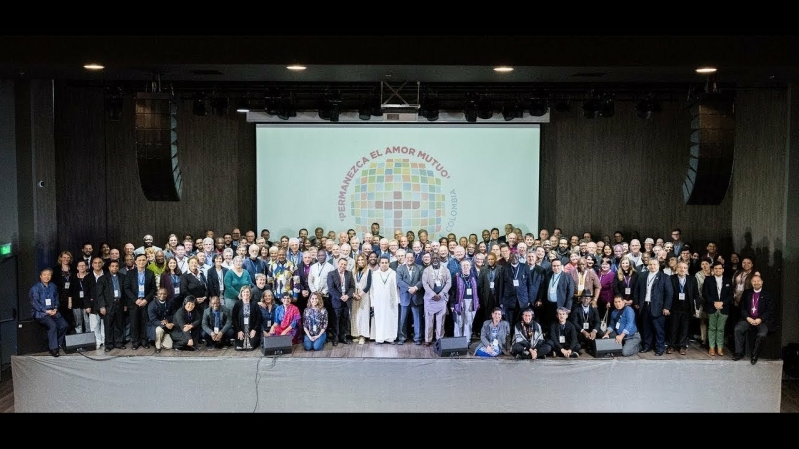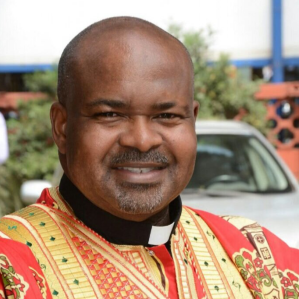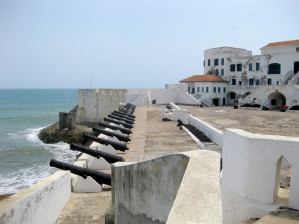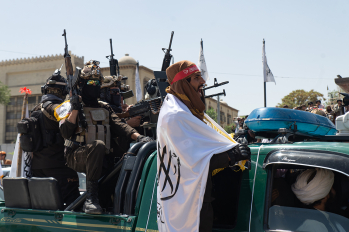
“The prayer that I pray for those who are coming for the global gathering is that they will see that God is on the move,” says Rev. Dr. Casely Essamuah, Secretary of the Global Christian Forum (GCF) as 250 representatives from all streams of Christianity are gathering in Accra, Ghana from April 16-19 for what is likely the most diverse meeting of Christian leaders globally.
From Roman Catholics to Pentecostals, from Orthodox to evangelicals, from Mainline Protestant to independent churches: the global forum is the place that brings them together for the fourth time as the GCF celebrates its 25th anniversary this year.
In an exclusive interview with Christian Daily International, Essamuah recounts the history, vision and purpose of what is “not an organization” but a “table” as he emphasizes more than once. And he expresses his hope for this week’s forum where he says his mission “is to set the table right, get the logistics right, get the microphones to be working, and get out of the way for the Holy Spirit to do that, which only the Holy Spirit can do.”
The issue: preaching unity but living divided?
Today, Christianity is split up into more than 45,000 denominations globally, which poses a great obstacle to many non-Christians who are questioning the authenticity of the Christian message because of divisions, Essamuah laments.
“All of us are claiming that humanity needs to be reconciled to God. All of us are saying God in Jesus Christ has reconciled broken humanity to himself, so please come along. But then we don’t even talk to each other, or we ignore each other, or we are indifferent towards each other, or in some instances, we even persecute each other,” he says.

“Meanwhile, the world is looking on and they say: these people are talking about reconciliation, but they don’t seem to have their act together. They’re eager to have us reconciled with God but not with one another. They’re eager to tell us that we’re all going to spend the same eternity together if we believe in Jesus Christ, but they’re not extending the same grace and the same love to one another as they should.”
Indeed, Christian history is full of episodes of division, conflict and even war between those adhering to different traditions. Oftentimes, newer expressions and movements have suffered persecution at the hand of the more established churches.
During the time of the Reformation in Europe, the Roman Catholic Church suppressed dissent and persecuted those who sought to reform the Church. The Reformers, on the other hand, at times persecuted expressions that went against their convictions, such as the Anabaptists. And while less extreme than in the past, suspicion, discrimination and conflict between churches or believers of different traditions remain a reality in various parts of the world today.
Discovering unity rather than manufacturing unity
Essamuah is clear-eyed about the challenges and obstacles to fostering greater unity in the global body of Christ. And he acknowledges differences in theology and other areas that are real and cannot be overlooked simply for the sake of presenting a superficial image of unity through an umbrella organization or by issuing joint statements.
Instead, the GCF focuses on bringing people together to listen to each other’s stories of faith, so that they could see how much they have in common as individual believers and followers of Jesus Christ, rather than looking at each other merely as official representatives of different Christian traditions.
We are not there to manufacture unity. We are not there to organize unity.
“We are not there to manufacture unity. We are not there to organize unity,” Essamuah says. “We are there to open our eyes to the unity we have in Christ. We are there to lean into it. We are there to say, oh my goodness, these are brothers and sisters.”
“We are not an organization, we are not there to issue a statement, we are not there to work on some doctrinal issues. We start from the standpoint of what unites us. And I always say immediately it is about who unites us. We are at the table because of Jesus Christ. He invites us to be at the table,” Essamuah says. “And we try to do that creating a space which is almost like an incubator for collaboration, for partnership. But in order to do that, we need to know each other. We need to know each other well.”
He says the question that drives these conversations is always the same: “What is God doing in your life as a person?”
He describes it further, saying, “Yes, you are there representing X church in this country. You have this title. But for you as a person, what is God doing in your life? Where did God take you from where you were to where you are now? How is God on the move in your life, in the life of your church, in the life of your country?”
“And as we begin to share those stories, there are bridges that we are able to cross and walls that we are able to tear down just because we realized that there's a lot of similarity. There's a lot that we work with as a result of our ethnicities, as a result of our denominations, as a result of our nations. But when you focus on who you are in Christ and what Christ has done for you, all of sudden you look at that person who is wearing a robe that you're not familiar with and say, oh my goodness, that's a brother!”
Everyone a guest at the table
While the GCF has succeeded in bringing together mostly high-level representatives of the different streams of Christianity, its history and format reveal the tension that remains between organized traditions and bodies that seek to foster unity among denominations.
Giving an overview of GCF’s history, Essamuah says, “25 years ago, the World Council of Churches was going through an evaluation of its mission, its strategy, its values, and realized that while it's called the World Council of Churches, it represented only 25% of the global Christian body. The Roman Catholic Church, which participates in some of its programs is not a full member. And even more importantly, the evangelicals, the Pentecostals and the charismatics who – by God's grace – are growing by leaps and bounds all over the world, didn't want to have anything to do with the World Council of Churches.”
“And so, they had a visionary leader in the person of Konrad Raiser who felt that the mission of the World Council of Churches was much more important and significant than the organization itself.”
If you set up an organization, nobody's going to come because there's a lot of suspicion. What about setting up a forum where no one has any privileged position?
“So, in order to facilitate the mission, which is to work towards realizing the unity that we have in Christ, how do you do that? Well, if you set up an organization, nobody's going to come because there's a lot of suspicion. What about setting up a forum where no one has any privileged position? The result was the launch of the GCF as a space where everyone who comes is a guest,” Essamuah says.
Today, the World Council of Churches, the World Evangelical Alliance, the Roman Catholic Church and the Pentecostal World Fellowship stand as the “four pillars” supporting the work of the GCF, with the Orthodox churches and independent churches completing the picture. The only requirements for participation are accepting the statement of faith that speaks about the humanity and deity of Jesus Christ, and the salvation found in Jesus Christ alone.
The two things followers of Christ cannot say
Not being organizationally tied together and by avoiding joint statements and doctrinal discussions, the GCF manages to navigate sensitive issues that could open it up to criticism from those who say theological differences are too significant to ignore.
Among evangelicals especially, there are those who are very conscious of what they consider serious compromises with non-negotiable Biblical beliefs, such as Mariology (the devotion to Mary) in the Roman Catholic Church or LGBTQ-affirming churches within the World Council of Churches. They argue that as long as these remain, they present insurmountable obstacles to spiritual unity.
Nevertheless, Essamuah believes in the importance of sharing faith conversation to create space for deeper understanding. He points to 1 Corinthians 12 where the Apostle Paul writes about the body of Christ and says being Christian means that unity is not optional.
“I always say there are two things that you can't say if you are a Christian, at least according to 1 Corinthians 12. You can't say, ‘I do not belong to the body.’ This is very clear. And you can't say, ‘I do not need you.’ Those two things, they're incompatible with being a Christian,” he says, and adds, “You're part of the body. Are you a Christian? Do we believe in Jesus Christ? Oh, then you are part of one body. Then you just got to open your eyes.”
Essamuah believes a lot of division and misunderstandings come from ignorance and prejudice about others. But the faith conversations reveal that there is often much more in common, even in terms of the formative faith journey and discipleship that individuals went through.
“There are one or two or three or four organizations that come up all the time, like Intervarsity, Scripture Union, Campus Crusade (now called Cru in some parts of the world), Navigators. But while they went to the same activities and fellowships, they then have different denominational labels, Lutherans or Catholics or Pentecostals or whatever.”
Trust goes up, suspicion goes down because you grew in your faith with the same elements that they all had.
“But hearing this, then all of a sudden, you're like, oh my goodness, we had the same discipleship, we had the same foundations of our walk with Jesus Christ. Trust goes up, suspicion goes down because you grew in your faith with the same elements that they all had,” Essamuah says, highlighting that this is a significant part of what the GCF is about.
For evangelicals who are still suspicious of engaging in conversation with those of other traditions, Essamuah points to a 2005 book by late theologian John Stott titled Evangelical Truth: A Personal Plea for Unity, Integrity and Faithfulness. Although 20 years old, it is still relevant today, Essamuah says.
“I think a lot of evangelicals will remember the name John Stott. He listed twelve things where within evangelicalism – this is within evangelicalism! – there's a wide spectrum of opinion diversity. I'll go through them very quickly because it's very interesting.”
He then went on to name them one by one, “Baptism: should it be infant or mature believers? Lord supper: should it be weekly, monthly, or once a year? Church governance: should it be episcopal or congregational? Worship: should it be liturgy or spontaneous? Charismata, the gifts of the Spirit: are they still important? The role of women: are they egalitarian, complementarian or neither? What degree of involvement should we have with others? Old Testament prophecy; sanctification; Church and state; mission; eschatology. These twelve areas and that's just among evangelicals, that's not Pentecostals, World Council of Churches, or others. Even among evangelicals, we have all this diversity!”
“So sometimes it's good to just pull back and ask yourself, what is our disunity and division doing to our witness? How is it affecting the witness that we are called to give to the world?” Essamuah says.
“That the world may know”
The GCF has been inspired by Jesus’ prayer in John 17:23, where he prays for the unity of his disciples as a witness to the world. Therefore, the theme of this year’s gathering is That the world may know.
There are a few things that stand out for Essamuah as particularly important this time. Firstly, it is the first gathering post-Covid, and he says, “Covid has had such a devastating impact on the world, and everybody knows that. But particularly on the Church, there are many churches that have not recovered from Covid.”
“There are many churches that have long-Covid. True that Covid gave us a lot of things that we are thankful and grateful for. We do more things by Zoom, by internet and all of that, yes. But it has also shown us the need and the desire and imperative for in-person connection.”
Secondly, the 25th anniversary provides an opportunity to look back and look ahead. “It's been 25 years, so it's a time to just pause, celebrate God's faithfulness in our lives as a forum and in the lives of those that are represented, and to ask God, what is it that you want us to do for the next 25 years or however long before the Lord?” Essamuah says.

And thirdly, a visit to Cape Coast. “Cape Coast is a wonderful town, but it has what we call slave castles. Those are places where slaves were kept and then were shipped to the West. We are going there as a symbolic gesture of pilgrimage,” he says.
“These are 250 leaders from all over the world. We're going there to say this is a painful part of our history because we know that the Bible was used, and the Bible was abused in justifying or rationalizing slavery. But we are not going there just to say, okay, this happened in the past. We want to ask ourselves, where is it now in our systems, in our world that we need to bring a Christian perspective to issues of injustice and how do we do that in a Christ-like way?”
“So we are not just going to look at those slave castles and all the dungeons and all of that. We're also going to have a service of lament, a service of repentance, a service of reconciliation, because ultimately our healing comes through Jesus Christ,” he comments.
Coming back to his hopes for the forum, Essamuah says, “God is on the move. At any such global gathering, you bring people from so many countries and so many languages together and you see that, my goodness, God is on the move.”
“God's Church is on the move. It's thriving in places, it's in persecution and it's suffering in places. But God is on the move. Believers are not sitting still. Believers are bearing witness, bearing faithful witness. And I hope that those who come will really be encouraged by it. And I hope that those who come will see that God's Church is bigger than my church.”




